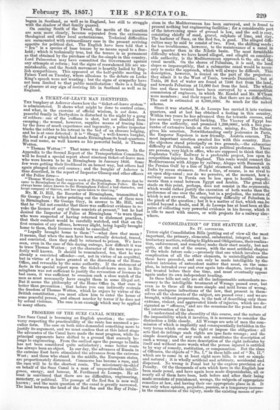A TICKET-OF-LEAVE MAN IDENTIFIED.
TILE burglary at Ashover shows how the "ticket-of-leave system" is administered. It shows what might be done to control crime, and what, in the exercise of official wisdom, is not done. A peaceful family in Derbyshire is disturbed in the night by a gang of robbers : one of the ruffians is shot, but not disabled from escaping; the wound, however, supplies means of tracing him: by the force of much experience and ingenuity, a police inspector tracks the robber to his retreat in the bed of an obscure lodging, and he is at once detected : it is" Shogg," a well-known burglar, the head of a gang which had made Birmingham its head-quarters. His real name, as well known as his powerful build, is Thomas Wotton.
"Thomas Wotton !" That name was already known. In the Appendix to the Second Report of the Transportation Committee, will be found a special report about nineteen ticket-of-leave men who were known to be in Birmingham in January 1.856. Some few were getting their livelihood in an honest way, but others had again plunged into evil courses ; and the burglar of Ashover is thus described, in the report of Inspector Glossop and other officers of the Police force
" Thomas Wotton (bad) went to work at Nottingham. He states that he came to Birmingham at the suggestion of the Nottingham Police. He has always borne (since known to the Birmingham Police) a bad character, and keeps company of thieves, and has again taken to thieving."
Mr. M. D. Hill, the Recorder of Birmingham, transmitted to Sir George Grey a letter pointing out the residence of these men in Birmingham : Sir George Grey, in answer to Mr. Hill, said that he "did not consider that there was sufficient evidence to revoke the licence of any of those convicts at present," but he had desired the Inspector of Police at Birmingham "to warn those who were suspected of having returned to dishonest practices, that their conduct would be carefully watched, and that on the first occasion of any offence, however slight, being legally brought home to them, their licences would be cancelled."
" Legally brought home to them ! "—what does that mean ? It means, that when the men have been actually detected, traced, and convicted, then they shall be returned to prison. We have seen, even in the case of this daring outrage, how difficult it was ' to trace Thomas Wotton ; yet the character of the man was perfectly well known. It should be remembered, too, that he was already a convicted offender—out, not in virtue of an acquittal, but in -virtue of a leave granted at the discretion of the Home Office, and revocable by the same authority. If the statement of , facts in the special report upon the ticket-of-leave men in Birmingham was not sufficient to justify the revocation of licences in I bad cases, it was sufficient to occasion such a close watch of the '1 men as must necessarily have caught them in some illegal act. !
But it seems the philosophy of the Home Office is, that cure is better than prevention ; that before you can indirectly restrain the freedom of Thomas Wotton, which he enjoys by virtue of the British constitution, you must allow him to enter the house of some peaceful person, and almost murder by terror if he does not by actual violence. The case is an example which may be applied to many others.


































 Previous page
Previous page